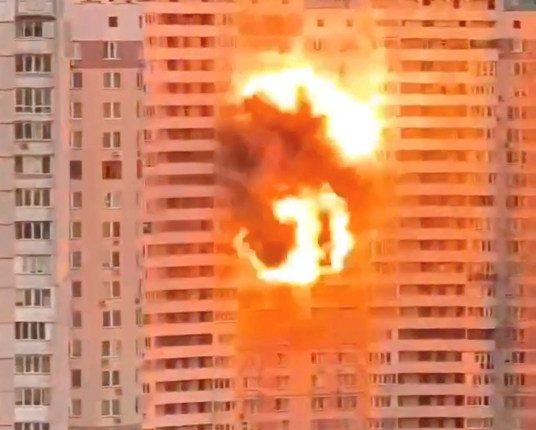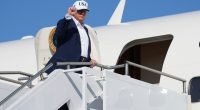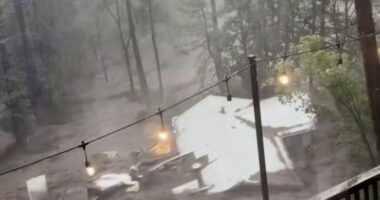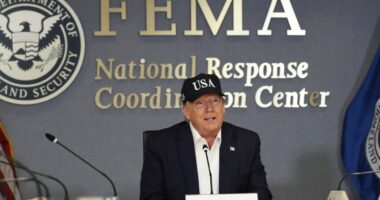Share this @internewscast.com
DONALD Trump has opened the floodgates to ship more weapons to Ukraine as it faces growing nightly blitzes.
Vladimir Putin is hammering Ukraine with hundreds of kamikaze drones and missiles a night which is overwhelming defence systems.
Dozens of innocents are being injured or killed as apartment buildings are mercilessly bombed and civilians terrorized by the tyrant.
Trump has been trying to force Moscow and Kyiv to the negotiating table and end the three-year-old war.
But Putin has snubbed peace and is instead steadily growing his nightly bomb salvos – which could soon hit 1,000 a day.
Trump seems to be increasingly dissatisfied with Putin after delaying new sanctions on Russia’s oil industry in an effort to encourage Putin to engage in peace discussions.
On Monday, the Trump said: “We’re going to send some more weapons. We have to. They have to be able to defend themselves.
“They’re getting hit very hard now.
“We’re going to have to send more weapons, defensive weapons, primarily.”
The White House announced on July 1 that the delivery of specific air defense missiles and other precision bombs to Ukraine had been paused due to concerns over decreasing weapons inventory.
But Trump told Volodymyr Zelensky that the weapons pause hadn’t been his decision, according to the Wall Street Journal.
The White House on Monday said the weapons pause was instead ordered by Defence Secretary Pete Hegseth.
Trump and Zelensky last held a call on July 4, just a week after they met in The Hague for the Nato conference.
Zelensky described the call as the “best one so far”.
Trump has also held a phone call with Putin, but said that he was “not happy” with the war after not making “any progress” in the chat.
He said: “[Putin] wants to go all the way, just keep killing people, it’s no good.”
Trump revealed the two leaders had spoken “a lot” about sanctions, adding: “He understands that it may be coming.”
Moscow’s firepower capability is continually growing, and Vlad’s forces have frequently surpassed their previous records for the largest daily bombardment in recent weeks.
Russia set a new record on Sunday with 539 drones and 11 missiles that wounded 26 people in Kyiv.
On Monday, bombs killed at least 11 civilians and injured more than 80 others, including seven children in horror strikes.
Ukraine needs a number of different air defence systems due to the different kinds of bombs Russia fires at it.
Patriot missiles are too expensive to hit hundreds of Vlad’s cheaply made drones as they cost $4m (£5.45m) each to make.
The rocket systems were successfully used a fortnight ago when they shot down every single missile that Iran fired at a US airbase in Qatar.
Russia fires Shahed-136 drones which are only thought to cost Vlad $35,000 (£47,000) each to make, according to CSIS.
The other drone widely used by the Kremlin is the Shahed 238, a jet-powered version of the Shahed 136, which can fly higher and faster, making it more difficult to intercept.
Shaheds only hit their target 10 per cent of the time, but with so many they overwhelm defences and terrorise Ukrainians.
They also clutter radar screens and make it tougher for Ukrainians to target Russia’s more dangerous ballistic missiles with the Patriot missiles.
Suicide drones can loiter in a specific area before being given a target to attack and have been used against both civilian and military targets.
Zelensky said on Monday: “Air defense remains the top priority for protecting lives.
“We are also actively advancing agreements on investing in our domestic weapons production, including all types of drones.
“Special focus is on interceptor drones.”
Senator Lindsey Graham said last week that Trump has given him the go-ahead to push forward with a bill he’s co-sponsoring that calls, in part, for a 500 per cent tariff on goods imported from countries that continue to buy Russian oil.
The move would have huge ramifications for China and India, two economic behemoths that buy Russian oil.
Meanwhile, Russia’s Defence Ministry said Monday that its troops shot down 91 Ukrainian drones in 13 Russian regions overnight, as well as over the Black Sea and the Crimean Peninsula.
Russia is also slowly advancing in the east of Ukraine as it conducts its summer offensive.
But it has been literally moving slower than a snail – with Kyiv’s “dronegrinder” warfare miring Putin’s summer offensive.




























